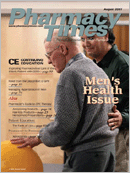Publication
Article
Pharmacy Times
Error-prone Abbreviations
Author(s):
Dr. Gaunt is a medication safety analyst and the editor of ISMP Medication Safety Alert! Community/Ambulatory Care Edition.
The use of abbreviations has always been problematic when communicating medical information. All too often, medical abbreviations hinder our understanding or are misread. It is not until medical abbreviations, symbols, or nonstandard dose designations lead to patient harm that action is taken to prevent future misunderstandings. Below are recent examples of error-prone abbreviations that have been reported to the Institute for Safe Medication Practices (ISMP).
Harm to Pets
A consumer recently contacted ISMP about an error involving her cat. After taking the feline to the veterinarian for a liver disorder, she received a prescription and dropped it off at the pharmacy.
The prescription was interpreted as URSO (ursodeoxycholic acid) 250 mg with instructions to give 1/2 tablet qid. Thinking that 4 times a day seemed excessive, however, she checked with the veterinarian and discovered that the medication was to be administered only once daily. Contributing to the problem was the use of the abbreviation sid (abbreviation for the Latin phrase semel in die), meaning once daily. It is commonly used in veterinary medicine; however, pharmacists and other health care professionals may be unfamiliar with the abbreviation and see it as qid, resulting in a fourfold overdose. If sid is used, pharmacists should consider alerting the prescriber about the potential for misinterpretation and recommend using daily.
QOWEEKA pharmacist recently reported an error involving an electronic prescription for adalimumab (Humira) 40 mg. Adalimumab is a subcutaneous injection indicated for reducing signs and symptoms of rheumatoid arthritis, psoriatic arthritis, and ankylosing spondylitis. The frequency provided on the prescription was ?QOWEEK,? intended to mean every other week. It was interpreted as every week, however, resulting in overdoses for 9 months. When prescribing or transcribing, be clear and write out ?every other week? in its entirety.
Another Unsafe AbbreviationA pregnant patient had been given a prescription for ?PNV? tablets (prenatal vitamins). The pharmacist receiving the prescription assumed that PNV stood for ?penicillin VK? and dispensed penicillin tablets in error. Luckily, the woman?s husband noticed the mistake right away and reported it to the pharmacist. Abbreviating drug names is an unsafe practice that should be avoided.
Misunderstood AbbreviationsA physician prescribed amoxicillin 200 mg/5 mL with instructions to administer 5 mL tid for a 3-year-old child. The pharmacy carried only a 250mg/5-mL strength, so the pharmacist changed the directions to ?Take 4 cc (4/5 teaspoonful) by mouth 3 times a day.? The child?s father misunderstood the directions, as English was his second language. He did not know what ?cc? meant, but upon seeing ?4/5 teaspoonful,? he thought he should give his child 4.5 teaspoons of the medication. After 5 doses, he brought his child to the emergency department with severe diarrhea. The use of 2 abbreviations contributed to the error: ?cc? and a slash mark (/).
The child?s father did not interpret either abbreviation as intended. Inadequate patient counseling also played a role. Although he had been given a 10mL measuring device for oral solutions marked in mL and teaspoons, specific directions for measuring each dose were not reviewed with the father when picking up the prescription. Counseling is especially important if a pharmacist must use a different concentration of drug than originally prescribed.
Subscribe to Newsletter
Pharmacy Times and the Institute for Safe Medication Practices (ISMP) would like to make community pharmacy practitioners aware of a pub?lication that is available.
The ISMP Medication Safety Alert! Community/ Ambulatory Care Edition is a monthly compilation of medication-related incidents, error-prevention rec?ommendations, news, and editorial content de?signed to inform and alert community pharmacy practitioners to potentially hazardous situations that may affect patient safety. Individual subscription prices are $48 per year for 12 monthly issues. Dis?counts are available for organizations with multiple pharmacy sites. This newsletter is delivered elec?tronically. For more information, contact ISMP at 215-947-7797, or send an e-mail message to [email protected].







